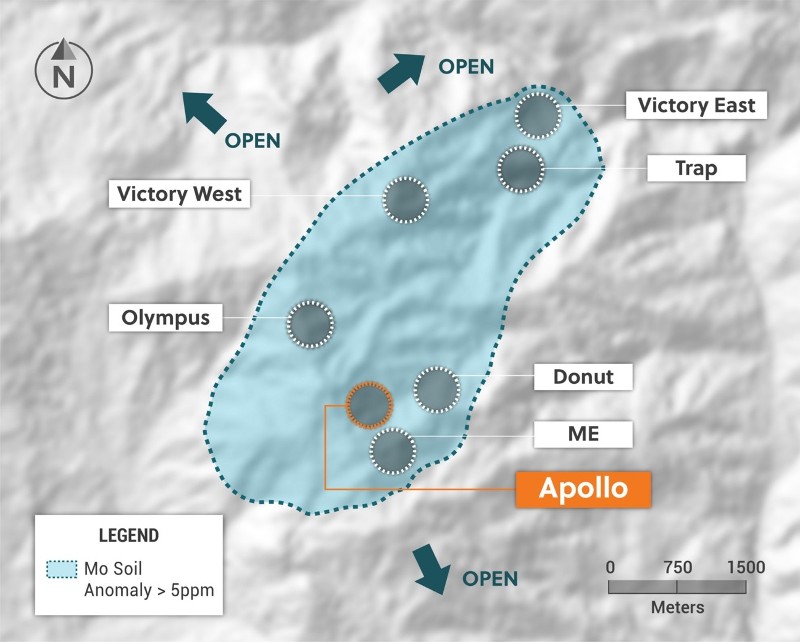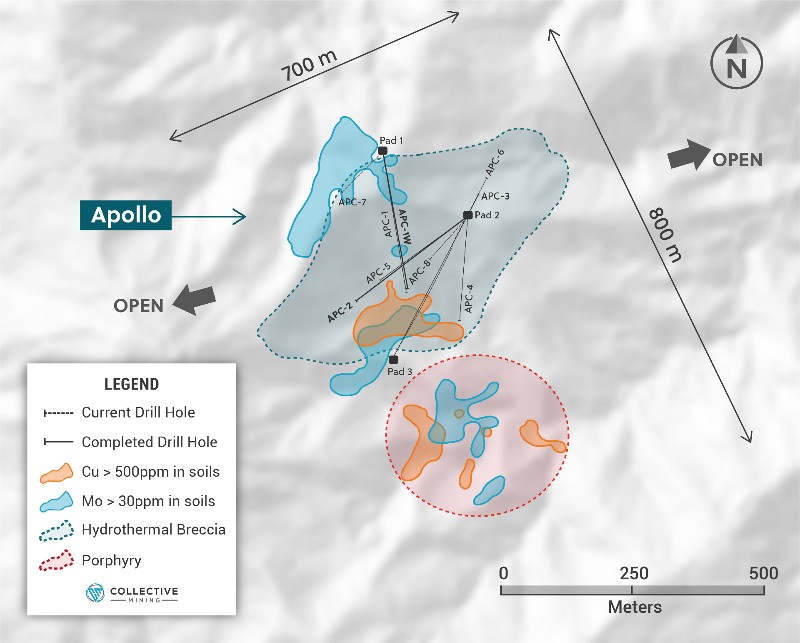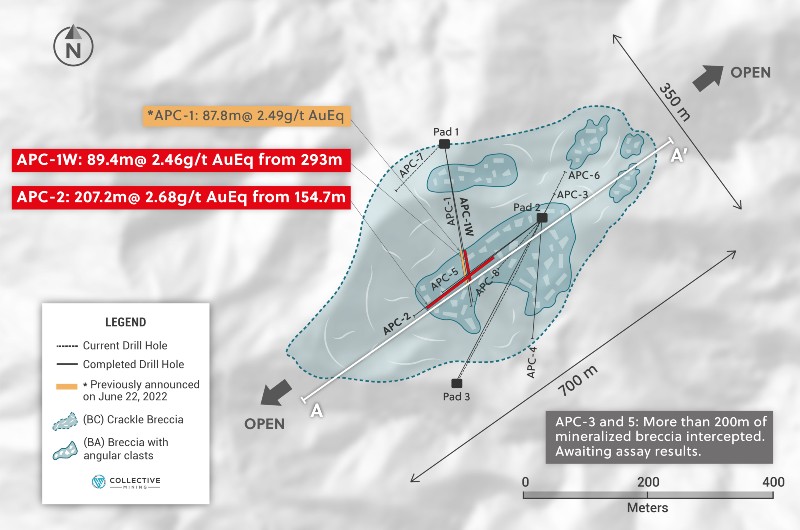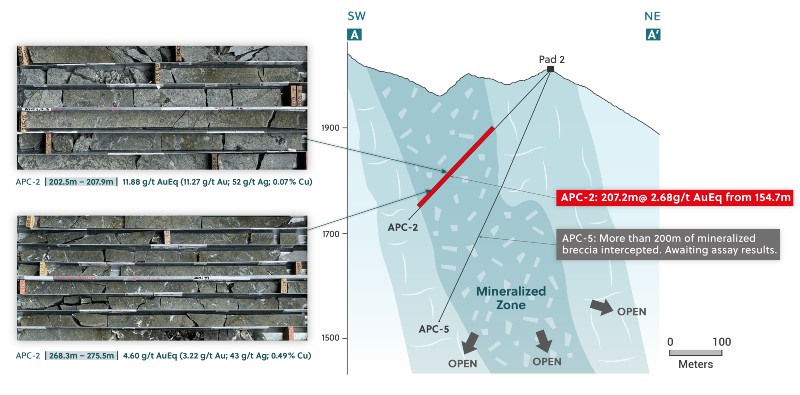- APC-2 intersected a broad zone of high-grade breccia mineralization with overprinting carbonate base metal veins beginning at 100 metres below surface returning:
- 207.15 metres @ 2.68 g/t gold equivalent
- APC-1W also intersected the main breccia structure with overprinting veining but was stopped short of the final target depth in a post mineral dyke due to rig capacity limits yet still yielded:
- 89.40 metres @ 2.46 g/t gold equivalent
- Drilled dimensions of the Apollo target now measure 300 metres along strike by up to 100 metres across by 400 metres vertical and remains open in all directions
- Assay results for drill holes APC-3 and APC-5 are expected in the near term. Both holes cut more than 200 metres of continuous mineralization in the main breccia body
Toronto, Ontario, August 10, 2022 – Collective Mining Ltd. (TSXV: CNL) (OTCQX: CNLMF) (“Collective” or the “Company”) is pleased to announce assay results from two additional holes completed at the Apollo target (“Apollo”) at the Company’s Guayabales project located in Caldas, Colombia. Apollo is a newly discovered high-grade copper-gold-silver porphyry-related breccia and is one of eight porphyry-related targets situated within a three-by-four-kilometre cluster area generated by the Company through grassroots exploration at the project. As part of its fully funded 20,000+ metre drill program for 2022, there are currently three diamond drill rigs operating at the Apollo target with an additional rig being mobilized to site to begin the Phase II program at the Olympus target in August 2022.
“With assay results in hand for three drill holes and visual observations from additional holes either recently completed or underway, it is becoming abundantly clear that we are dealing with a large mineralized system. Importantly, Apollo appears to be blessed with multiple pulses of fluids depositing metal into the system resulting in high-grade bulk drilling intervals. Our reconnaissance work in and around Apollo suggests we may only be on the tip of the iceberg in terms of understanding this system as our technical team believes that the main breccia discovery at Apollo may be the first in a series of porphyry and breccia discoveries in this area,” commented Ari Sussman, Executive Chairman.
A short video presented by Richard Tosdal and David Reading discussing the assay results and related drill core can be seen by clicking here.
Details (See Table 1 and Figures 1 – 4)
Three diamond drill holes with accompanying assay results confirm that the Apollo target has the potential to evolve into a significant high-grade, bulk tonnage mineralized system. New assay results for holes APC-2 and APC-1W are reported herein as follows:
- APC-2:
207.15 metres @ 2.68 g/t AuEq from 154.5 metres down hole (100m vertical) including
17.40 metres @ 7.33 g/t AuEq from 192.5 metres down hole and
20.95 metres @ 5.21 g/t AuEq from 270.6 metres down hole.
APC-2 is the first hole drilled from a newly constructed pad located approximately 200 metres to the southeast of the initial pad from which drill holes APC-1 and APC-1W were drilled. APC-2 was drilled orthogonal to APC-1 and APC-1W and intersected bulk mineralization hosted within porphyry related breccia with overprinting carbonate base metal veins (“CBM”).
- APC-1W:
89.40 metres @ 2.46 g/t AuEq from 293 metres down hole (175m vertical) including
19.35 metres @ 3.87 g/t AuEq from 93.8 metres down hole and
15.30 metres @ 2.31 g/t AuEq from 164.36 metres down hole.
APC-1W was drilled as a wedge hole from discovery hole APC-1 to the east and at a steeper inclination. The hole was stopped short of the target depth in a post-mineral dyke due to rig capacity issues. The hole was expected to re-enter the main mineralized breccia after clearing the dyke and extend the zone further to the south. Future drilling will test the area south of APC-1W to determine if mineralization extends beyond the post-mineral dyke in this location.
- Mineralization is remarkably continuous along the axis of both intercepts and is hosted within an angular breccia with a sulphide matrix consisting of chalcopyrite (Cu), pyrite and pyrrhotite. Additionally, overprinting carbonate base metal porphyry veins flood the breccia matrix in various locations along the mineralized interval yielding the higher-grade intercepts in both holes. The breccia clasts are all quartz diorite and diorite in composition and this hydrothermal system is clearly linked to a porphyry system.
- APC-2 was drilled perpendicular to APC-1W and has extended the mineralized breccia at least 200 metres to the northeast and 100 metres to the southwest. Two further holes, APC-3 and APC-5 have been completed with more than 200 metres of favorable mineralization intersected in both holes. Assay results for APC-3 and APC-5 are anticipated the near term.
- Assay results and visual observation from all holes completed to date confirm that the main mineralized breccia has a minimum strike length of 300 metres in a northeast-southwest direction, is up to 100 metres thick and extends to at least 400 metres vertically below surface. The target remains open in all directions for expansion.
- The Apollo target area, as defined to date by surface mapping, rock sampling and copper and molybdenum soil geochemistry, covers an 800 metre X 700 metre area. The Apollo target area hosts the Company’s new grassroots main breccia discovery plus additional yet untested breccia, porphyry and vein targets. The Apollo target area also remains open for further expansion.
Table 1: Assays Results
| HoleI D |
From (m) |
To (m) |
Intercept (m)** |
Au (g/t) |
Ag (g/t) |
Cu % |
Zn % |
Pb % |
Mo % |
AuEq (g/t)* |
| APC1-W |
293 |
382.4 |
89.40 |
0.89 |
58 |
0.39 |
0.07 |
0.06 |
0.001 |
2.46 |
| Incl |
296.6 |
315.9 |
19.35 |
1.04 |
128 |
0.53 |
0.13 |
0.12 |
0.001 |
3.87 |
| |
367.1 |
382.4 |
15.30 |
1.90 |
16 |
0.14 |
0.01 |
0.00 |
0.001 |
2.31 |
| APC-2 |
154.7 |
361.9 |
207.15 |
1.46 |
45 |
0.31 |
0.075 |
0.05 |
0.002 |
2.68 |
| Incl |
192.5 |
209.9 |
17.40 |
6.57 |
44 |
0.08 |
0.285 |
0.23 |
0.003 |
7.33 |
| |
270.6 |
291.6 |
20.95 |
3.67 |
68 |
0.41 |
0.034 |
0.03 |
0.002 |
5.21 |
*AuEq (g/t) is calculated as follows: (Au (g/t) x 0.95) + (Ag g/t x 0.014 x 0.95) + (Cu (%) x 1.96 x 0.95) + (Mo (%) x 7.35 x 0.95)+(Zn(%)x 0.86 x 0.95)+ (Pb(%)x 0.44 x 0.95) utilizing metal prices of Cu – US$4.00/lb, Mo – US$15.00/lb, Zn – US$1.75/lb, Pb – US$0.9/lb, Ag – $20/oz and Au – US$1,400/oz and recovery rates of 95% for Au, Ag, Cu, Mo, Zn and Mo. Recovery rate assumptions are speculative as no metallurgical work has been completed to date.
** A 0.4 g/t AuEq cut-off grade was employed with no more than 10% internal dilution. True widths are unknown, and grades are uncut.
Figure 1: Plan View of the Guayabales Project Highlighting the Apollo Target

Figure 2: Plan View of the Apollo Target Area Outlining the Porphyry and Breccia Targets, their Related Soil Anomalies and Drill Holes Completed or Currently Underway

Figure 3: Plan View With Drill Hole Traces of the Main Breccia Discovery Made at Apollo

Figure 4: Apollo Target Cross Section N-S with Core Photo Highlights for APC-2

About Collective Mining Ltd.
To see our latest corporate presentation, please visit www.collectivemining.com
Collective Mining is an exploration and development company focused on identifying and exploring prospective mineral projects in South America. Founded by the team that developed and sold Continental Gold Inc. to Zijin Mining for approximately $2 billion in enterprise value, the mission of the Company is to repeat its past success in Colombia by making significant new mineral discoveries and advance the projects to production. Management, insiders and close family and friends own nearly 45% of the outstanding shares of the Company and as a result, are fully aligned with shareholders.
The Company currently holds an option to earn up to a 100% interest in two projects located in Colombia. As a result of an aggressive exploration program on both the Guayabales and San Antonio projects, a total of eight major targets have been defined. The Company has made significant grassroot discoveries at both projects with near-surface discovery holes at the Guayabales project yielding 302 metres at 1.11 g/t AuEq at the Olympus target, 163 metres at 1.3 g/t AuEq at the Donut target and recently, at the Apollo target, 207.15 metres at 2.68 g/t AuEq, 89.4 metres at 2.46 g/t AuEg and 87.8 metres at 2.49 g/t AuEg. At the San Antonio project, the Company intersected, from surface, 710 metres at 0.53 AuEq. (See related press releases on our website for AuEq calculations)
Qualified Person (QP) and NI43-101 Disclosure
David J Reading is the designated Qualified Person for this news release within the meaning of National Instrument 43-101 (“NI 43-101”) and has reviewed and verified that the technical information contained herein is accurate and approves of the written disclosure of same. Mr. Reading has an MSc in Economic Geology and is a Fellow of the Institute of Materials, Minerals and Mining and of the Society of Economic Geology (SEG).
Technical Information
Rock and core samples have been prepared and analyzed at SGS laboratory facilities in Medellin, Colombia and Lima, Peru. Blanks, duplicates, and certified reference standards are inserted into the sample stream to monitor laboratory performance. Crush rejects and pulps are kept and stored in a secured storage facility for future assay verification. No capping has been applied to sample composites. The Company utilizes a rigorous, industry-standard QA/QC program.
Contact Information
Collective Mining Ltd.
Steven Gold, Vice President, Corporate Development and Investor Relations
Tel. (416) 648-4065
FORWARD-LOOKING STATEMENTS
This news release contains certain forward-looking statements, including, but not limited to, statements about the drill programs, including timing of results, and Collective’s future and intentions. Wherever possible, words such as “may”, “will”, “should”, “could”, “expect”, “plan”, “intend”, “anticipate”, “believe”, “estimate”, “predict” or “potential” or the negative or other variations of these words, or similar words or phrases, have been used to identify these forward-looking statements. These statements reflect management’s current beliefs and are based on information currently available to management as at the date hereof.
Forward-looking statements involve significant risk, uncertainties, and assumptions. Many factors could cause actual results, performance, or achievements to differ materially from the results discussed or implied in the forward-looking statements. These factors should be considered carefully, and readers should not place undue reliance on the forward-looking statements. Although the forward-looking statements contained in this news release are based upon what management believes to be reasonable assumptions, Collective cannot assure readers that actual results will be consistent with these forward-looking statements. These forward-looking statements are made as of the date of this news release, and Collective assumes no obligation to update or revise them to reflect new events or circumstances, except as required by law.
Neither the TSXV nor its Regulation Services Provider (as that term is defined in the policies of the TSXV) accepts responsibility for the adequacy or accuracy of this news release.



